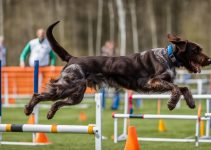As a dog lover and owner, I understand how important it is to address common behavior issues in our furry friends. Beagles, in particular, have their own set of quirks that can sometimes present challenges. That’s why in this article, I want to focus on providing solutions for beagle behavior problems.
Whether you’re dealing with excessive barking, separation anxiety, destructive chewing, or aggression, understanding the underlying causes and implementing effective training techniques is key to managing and correcting these behaviors. With the right approach, you can help your beagle become a well-behaved and obedient companion.
Throughout this article, I will be sharing practical tips and training methods to address common beagle behavior issues. From obedience training to managing separation anxiety, I will cover a range of topics to help you navigate through the ups and downs of beagle ownership.
So, if you’re ready to delve into the world of beagle behavior and discover ways to effectively manage and correct their behaviors, let’s get started!
Understanding Beagle Behavior Traits
Beagles are beloved pets known for their unique behavior traits and temperament. To effectively manage and provide the best care for your beagle, it is important to understand these distinctive characteristics.
One of the most notable beagle behavior traits is their exceptional sense of smell. Beagles have been bred for their hunting abilities, and their keen noses can lead to some interesting behaviors. Their strong sense of smell can make them easily distracted, restless, and sometimes stubborn during walks or training sessions. It is important to be patient and consistent when working with your beagle to navigate their nose-driven behaviors.
Another key behavior trait of beagles is their active and energetic nature. These dogs have a lot of energy and require regular exercise to prevent boredom and destructive behaviors. Going for daily walks or engaging in interactive playtime can help channel their energy in a positive way. Providing mental stimulation, such as puzzle toys or scent games, can also help prevent attention-seeking behaviors.
Understanding beagle temperament is vital in managing their behavior. Beagles are highly intelligent dogs that thrive on mental stimulation. They enjoy learning new things and participating in activities that challenge their minds. Engaging in positive reinforcement training and providing mental enrichment activities will keep your beagle’s mind sharp and prevent behaviors arising from boredom.
Excessive Barking in Beagles
Beagles are known for their vocal nature, thanks to their hunting instincts and sharp sense of smell. This can sometimes lead to excessive barking, which can be triggered by exciting scents, new noises, anxiety, or boredom. Managing beagle barking requires understanding the underlying cause and implementing appropriate training techniques.
To address excessive barking in beagles, here are some tips to consider:
- Teach your beagle a “quiet” command: By training your dog to understand and respond to the “quiet” command, you can effectively communicate when it’s time to stop barking.
- Ignore unwanted barking: Beagles thrive on attention, so by ignoring their barking and only rewarding quiet behavior, you can discourage excessive barking.
- Avoid triggers: Identify the situations or stimuli that trigger your beagle’s barking and take preventive measures to minimize their exposure to those triggers.
- Utilize positive reinforcement: Reward your beagle when they exhibit desired behavior, such as remaining quiet or responding to your commands. This positive reinforcement encourages them to repeat these behaviors.
Remember, managing beagle barking takes time, consistency, and patience. With proper training and understanding, you can effectively reduce excessive barking in your beagle and promote a peaceful environment for both you and your furry friend.

Dealing with Separation Anxiety in Beagles
Beagles are social dogs and may experience separation anxiety when left alone for extended periods. This can manifest in behaviors such as excessive barking, destructive chewing, and escape attempts. As a beagle owner, it is important to understand how to manage and prevent separation anxiety in your furry friend.
To start, establishing a gradual routine can help your beagle adjust to being alone. Start with short periods of separation and gradually increase the duration over time. This can help your beagle feel more comfortable and secure when you’re not around.
Avoid overly emotional goodbyes and hellos. While it may be tempting to shower your beagle with affection before leaving or when returning, this can actually reinforce their anxiety. Instead, keep your departures and arrivals calm and low-key. This will help your beagle understand that your absence is not a cause for concern.
Create a safe space for your beagle. This can be a designated area in your home where your beagle feels secure and comfortable. Fill it with their favorite toys, blankets, and perhaps an item with your scent to provide reassurance when you’re away.
Consider crate training. While not suitable for every beagle, crate training can be an effective way to provide a den-like environment that helps reduce anxiety. Ensure the crate is large enough for your beagle to stand, turn, and lie down comfortably, and make it a positive space with treats and toys.
Seeking professional help from a veterinarian or canine behaviorist can also be beneficial in addressing separation anxiety. They can provide personalized advice and guidance tailored to your beagle’s specific needs and behavior.
By implementing these strategies and seeking professional guidance if needed, you can help your beagle overcome separation anxiety and ensure a happier, more relaxed companion.
Addressing Destructive Chewing in Beagles
Beagles, especially puppies, may engage in destructive chewing as they explore their environment or alleviate boredom. This behavior can lead to damage to belongings and potential health risks. To address destructive chewing, there are several effective solutions:
- Provide appropriate chew toys: Giving your beagle access to durable chew toys can redirect their chewing behavior onto safe and appropriate objects. Look for toys specifically designed for strong chewers.
- Regular exercise: Ensuring your beagle gets plenty of exercise can help alleviate boredom and reduce the need for destructive chewing. Regular walks, play sessions, and mental stimulation activities can tire them out and redirect their energy.
- Use deterrent sprays: Applying bitter-tasting or unpleasant-smelling sprays to household items that your beagle is prone to chewing can discourage them from further destructive behavior. Always check that these sprays are safe for dogs.
- Supervised free time: When your beagle is not in their crate or confined area, closely supervise their activities. This allows you to immediately redirect their chewing behavior and provide appropriate alternatives.
- Behavioral training: Implement positive reinforcement training techniques to teach your beagle what is acceptable to chew on and what is not. Reward good behavior with praise and treats, and redirect them to appropriate chew toys when needed.
By implementing these strategies, you can effectively manage and prevent destructive chewing in your beagle, promoting a safe and harmonious environment for both your pet and your belongings.

Managing Aggression and Dominance in Beagles
Beagles are known for their friendly and sociable nature, but like any dog, they can sometimes display aggression or dominance issues. Understanding and addressing these behaviors is crucial for maintaining a happy and harmonious household. In this section, I will provide practical tips and strategies for managing beagle aggression and dominance.
Causes and Triggers
Aggression and dominance in beagles can stem from various factors, including fear, territoriality, resource guarding, lack of socialization, or previous negative experiences. Triggers for aggression may include unfamiliar dogs, certain environments, or specific situations that make your beagle feel threatened or anxious.
Firm and Consistent Discipline
Addressing aggression and dominance requires firm and consistent discipline. Establishing yourself as the pack leader through assertive but not aggressive behavior is essential. Maintain a calm and confident demeanor, set clear boundaries, and enforce rules consistently. Beagles thrive when they have a strong leader to guide them.
Positive Reinforcement Training
Positive reinforcement training is an effective way to address aggression and dominance in beagles. Rewarding good behavior with treats, praise, and affection can encourage your beagle to display more desirable actions. Use commands such as “sit,” “stay,” and “leave it” to redirect your beagle’s attention and reinforce obedience.
Seek Professional Help
If you’re struggling to manage your beagle’s aggression or dominance issues, don’t hesitate to seek professional help. Consulting with an animal behaviorist or trainer who specializes in working with beagles can provide invaluable guidance and tailored solutions for your specific situation. They can assess the root causes of the aggression and develop a customized behavior modification plan.
By implementing firm and consistent discipline, incorporating positive reinforcement training, and seeking professional assistance when needed, you can effectively manage aggression and dominance in your beagle. Remember, addressing these behaviors requires patience, consistency, and understanding. With the right approach, you can help your beagle develop into a well-behaved and balanced companion.
Factors to Consider and Professional Help
When dealing with beagle behavior problems, it is vital to consider various factors that can influence their behavior. Factors such as health issues, age, previous history, changes in the dog’s life, and the actions of family members can all play a role in shaping a beagle’s behavior.
Understanding these factors is crucial as they can provide valuable insights into the underlying causes of behavior problems in beagles. By identifying and addressing these root causes, you can effectively manage and prevent unwanted behaviors.
If despite your best efforts, the beagle behavior problems persist or become overwhelming, it may be time to seek professional help. A veterinarian or animal behaviorist with expertise in canine behavior can provide the necessary guidance and support to address the behavior issues your beagle is facing.
Professional help can be especially beneficial in complicated cases or when the behavior problems pose a risk to the well-being of your beagle or the people around them. These experts can analyze the situation, develop a customized behavior modification plan, and offer professional training techniques tailored to your beagle’s specific needs.
Remember, seeking professional help is not a sign of failure but rather a proactive step towards improving your beagle’s behavior and overall quality of life. With their expertise and guidance, you can navigate through challenging behavior issues and strengthen your bond with your furry companion.
For more information on factors influencing beagle behavior and seeking professional help for beagle behavior issues, refer to the table below:
| Resource | Description |
|---|---|
| Local Veterinarian | Contact your local veterinarian for advice, referrals, and potential medical causes of behavior issues. |
| Animal Behaviorist | Consult with a certified animal behaviorist who specializes in canine behavior for a deeper understanding of your beagle’s behavior problems and effective strategies to address them. |
| Training Classes | Enroll your beagle in obedience training classes or behavior modification programs run by professional dog trainers to address specific behavior issues. |
| Online Resources | Explore reputable online resources, forums, and educational websites dedicated to dog behavior for additional tips, techniques, and support. |
Remember, addressing beagle behavior problems requires patience, consistency, and a comprehensive approach. By considering the various factors influencing your beagle’s behavior and seeking professional help when needed, you can strengthen the bond with your furry friend and create a harmonious environment for both of you.
Conclusion and Further Resources
Understanding and managing beagle behavior problems is essential for ensuring a happy and healthy relationship with your dog. By addressing issues such as excessive barking, separation anxiety, destructive chewing, and aggression, you can promote positive behavior and harmony within your household.
If you need further assistance, there are resources available to help you. Behavior hotlines and professional animal trainers/behaviorists are knowledgeable in beagle behavior and can provide additional guidance and support. They can offer expert advice tailored to your specific situation, helping you navigate and overcome any challenges you may be facing.
Remember, every beagle is unique, and it’s important to approach behavior problems with patience, consistency, and positive reinforcement. By working together with your beagle, you can address these issues and foster a strong bond built on trust and understanding.
For more in-depth information and solutions for beagle behavior problems, be sure to explore the further resources provided below:
– [Resource 1]: A comprehensive guide on beagle behavior and training
– [Resource 2]: Online forums and communities dedicated to beagle owners
– [Resource 3]: Books and publications specifically focused on beagle behavior solutions
– [Resource 4]: Local training classes and workshops offered by reputable organizations
Take advantage of these resources to enhance your knowledge, gain valuable insights, and find effective strategies to address any behavior challenges you may be encountering with your beagle.






